Retreat Guidelines
For people who have never meditated before, this will be a unique experience. Even those who have done some meditation will find that the approach followed here offers perspectives unlike any place else. Because meditation explores the human mind (or heart) which is vast, profound, and complex, there will be beautiful moments and very difficult ones. You will be challenged deeply within yourself. If you keep trying to practise meditation, you will realize happiness that is beyond conventional happiness. We hope you could discover the most important thing in your life and a happier and more peaceful world for you and our friends – human, animal, plant – and even things that are "non-living".
Guidance by Dhamma speakers (friends)
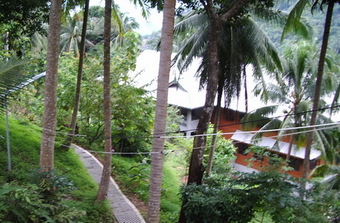
Women's Dormitory
Each day there will be a session on the theory and practice of the Buddha's teaching. The practice is systematic, so its expla-nation will be systematic as well. A variety of tips and ways of dealing with problems or obstacles will be talked about. The abbot or other speakers, both monks or lay persons, will address the group regularly, talking about meditation and the Dhamma.
At Dipabhāvan we do not think of ourselves as teachers; rather we try to be good Dhamma friends. The Dhamma friends who will be giving talks and helping in other ways are all practising mediators. Each brings differing backgrounds and experiences, but Ajahn Buddhadasa's teachings provides the common framework for all of us. By helping during the retreat and sharing what we have learned from our previous training we have the valuable opportunity to learn and develop our minds further and further as well.
We ask you to listen carefully and try to understand the explanations given. We do not expect, however, that you believe everything we say. Please listen and consider what you hear. Then experiment with it – try it out for yourself. The retreat is a trial to see if things work for you. If things work, then you can believe in what works, and only that, as your experience allows. In short, we ask you to take full responsibility for your own learning and training.
While at Dipabhāvan we ask you to follow the instructions given here. To do otherwise will lead to confusion for you and others. It might even lead to more significant difficulties. Questions or problems about the teaching can be discussed after a few days with a Dhamma speaker in a private interview (see the ACTIVITIES section). Otherwise, stick to the instructions. If you have been practising other meditation techniques, we ask you to put them aside for the retreat. It is important not to confuse different techniques and approaches.
At Dipabhāvan we do not think of ourselves as teachers; rather we try to be good Dhamma friends. The Dhamma friends who will be giving talks and helping in other ways are all practising mediators. Each brings differing backgrounds and experiences, but Ajahn Buddhadasa's teachings provides the common framework for all of us. By helping during the retreat and sharing what we have learned from our previous training we have the valuable opportunity to learn and develop our minds further and further as well.
We ask you to listen carefully and try to understand the explanations given. We do not expect, however, that you believe everything we say. Please listen and consider what you hear. Then experiment with it – try it out for yourself. The retreat is a trial to see if things work for you. If things work, then you can believe in what works, and only that, as your experience allows. In short, we ask you to take full responsibility for your own learning and training.
While at Dipabhāvan we ask you to follow the instructions given here. To do otherwise will lead to confusion for you and others. It might even lead to more significant difficulties. Questions or problems about the teaching can be discussed after a few days with a Dhamma speaker in a private interview (see the ACTIVITIES section). Otherwise, stick to the instructions. If you have been practising other meditation techniques, we ask you to put them aside for the retreat. It is important not to confuse different techniques and approaches.
Activities
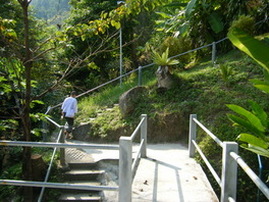
Meditation and the Dhamma Talks are the main focus of the retreat and have been introduced on the "Meditation Retreat" page already. Here we would like to explain some of the other activities.
Chanting
We chant short passages from the Buddhist scriptures that deal with important topics related to meditation and Dhamma talks. Thus, they further support the teachings. When practiced correctly, chanting is relaxing, calming, and joyful. It requires mindfulness and develops a certain level of concentration. It is a good opportunity for reflection and deepening understanding. Some people may feel that "Buddhist" chants conflict with their own religious beliefs. If so, you need not chant along, if it makes you uncomfortable. We recommend, however, that you stay in the hall and listen quietly.
Personal Interviews (Optional)
There may be times when you have further personal questions you wish to discuss individually with a Dhamma speaker. In that case, you can make an appointment for a personal interview. We ask that the interview questions be directly related to the meditation instruction and personal experiences during the retreat. Philosophy and argument can wait until after the retreat. It is best to wait until there is something personally meaningful to discuss before signing up for an interview.
Precepts (The moral foundation of meditation and mental development)
The calming of the mind and an understanding of life that develop in meditation need a firm foundation on which to grow. A calm mind is greatly helped by a peaceful environment, which is largely created by our own actions. Thus, careful living according to principles of non-harming, non-abuse (to self or others), compassion, and unselfishness is vital for meditation. In Buddhism these principles are most easily expressed as the Five Precepts (or Trainings), as follows:
Chanting
We chant short passages from the Buddhist scriptures that deal with important topics related to meditation and Dhamma talks. Thus, they further support the teachings. When practiced correctly, chanting is relaxing, calming, and joyful. It requires mindfulness and develops a certain level of concentration. It is a good opportunity for reflection and deepening understanding. Some people may feel that "Buddhist" chants conflict with their own religious beliefs. If so, you need not chant along, if it makes you uncomfortable. We recommend, however, that you stay in the hall and listen quietly.
Personal Interviews (Optional)
There may be times when you have further personal questions you wish to discuss individually with a Dhamma speaker. In that case, you can make an appointment for a personal interview. We ask that the interview questions be directly related to the meditation instruction and personal experiences during the retreat. Philosophy and argument can wait until after the retreat. It is best to wait until there is something personally meaningful to discuss before signing up for an interview.
Precepts (The moral foundation of meditation and mental development)
The calming of the mind and an understanding of life that develop in meditation need a firm foundation on which to grow. A calm mind is greatly helped by a peaceful environment, which is largely created by our own actions. Thus, careful living according to principles of non-harming, non-abuse (to self or others), compassion, and unselfishness is vital for meditation. In Buddhism these principles are most easily expressed as the Five Precepts (or Trainings), as follows:
- To refrain from killing living beings.
- To refrain from taking what is not given.
- To refrain from improper sexual behavior.
- To refrain from false speech.
- To refrain from the use of intoxicants and mind-clouding drugs.
Living conventions
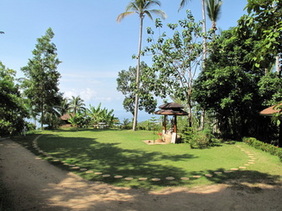
Voluntary Restraint
A meditation retreat is an extraordinary situation (although meditation is actually perfectly normal). A large group of people must live together in very simple condition, while relating to each other in a whole new way. Here, we relate through the common experience of meditation, with all its pains and joys, discoveries and frustrations. For these days our lifestyle is built around a common purpose rather than the more selfish purposes promoted by the world today. To accomplish this in harmony, we must agree on certain conventions. The most important are mindful silence, giving way to others, sticking to the schedule, following instructions (discussed above), and staying within the boundaries of the meditation environment.
Silence
Much energy and ego goes into our speech. We say things that don't need to be said, are gossipy, or even harmful. This not only makes the world noisy, it makes our own mind noisy.
We require not speaking or passing notes to each other during the retreat, in order to quieten our mind and maintain a quiet, peaceful environment for everyone. This can be difficult at times, but most people find it a powerful and wonderful experience. Many people travel from far away to Dipabhāvan because they cherish this silence, so we respect each other by maintaining the silence with mindfulness and wisdom. Even training ourselves to walk, move, and do things quietly leads to a calm and graceful experience. It is also important not to judge or project opinions onto others. Developing self–discipline and a compassionate understanding for all things is part of the training.
Keeping silent includes putting away books you've brought along. You will get plenty of information while you are on the retreat. Reading will just be a distraction, or may even confuse you. Please keep your books closed throughout the retreat. You have all the time you want to read when you leave. We also request that you stop writing, except for notes that you take during talks. Letter writing, diaries and creative writing will take the mind away from our purpose here.
Following the Schedule
As discussed before, the schedule we follow is not a heavy one, in fact it is very calming for everyone – you don't even need a watch – the monastery bell will let you know where to be at any given time. We ask that you take part in all meditation sessions and Dhamma talks. There is plenty of free time at specified times in the day to wash clothes, bathe, relax and reflect on the experience.
Helping Out
Everyone is asked to sign up to do a daily chore on registration day. Helping out develops a sense of communal responsibility – a respect for each other and for the monastery. The chores usually take no more than 20 minutes to do each day, and we encourage you to be mindful as you go about doing them. Everything we do in life is practicing the Dhamma in a real, authentic way; this also applies to how we do our chores during the retreat.
Staying In
There is no place to go but inward. But at times that can be a frightening journey. Or maybe we just feel bored or restless. These are the most important times to be mindful and aware. It is just these states of mind from which we and learn so much about ourselves. Do not wander outside the retreat center at these times. If we wander off without restraint, pretty soon it becomes difficult to bring ourselves back to meditation. Be sure you have everything you need before the retreat begins.
Cigarettes
Cigarettes are a form of intoxicant. They interfere with the meditation and make it very difficult for you to relax naturally. Everyone must stop smoking while at the retreat.
Giving Way
The ways of the world are self-assertive, pushy, and aggressive. Here, we need to give each other space and quiet. There is nothing to hurry over; we can go about things with a calm and cool mind. Giving way to others is not just in physical acts, but more important is an attitude of friendliness, kindness, and support which we carry in our hearts. Our way of living and being here can reflect this attitude without saying a word.
Smiles
This often-forgotten blessing can transform many unpleasant situations. With a smile, silence is wonderful. Without smiles, the meditation hall becomes a tomb. Try out the gentle, knowing, kind smile of the Buddha.
A meditation retreat is an extraordinary situation (although meditation is actually perfectly normal). A large group of people must live together in very simple condition, while relating to each other in a whole new way. Here, we relate through the common experience of meditation, with all its pains and joys, discoveries and frustrations. For these days our lifestyle is built around a common purpose rather than the more selfish purposes promoted by the world today. To accomplish this in harmony, we must agree on certain conventions. The most important are mindful silence, giving way to others, sticking to the schedule, following instructions (discussed above), and staying within the boundaries of the meditation environment.
Silence
Much energy and ego goes into our speech. We say things that don't need to be said, are gossipy, or even harmful. This not only makes the world noisy, it makes our own mind noisy.
We require not speaking or passing notes to each other during the retreat, in order to quieten our mind and maintain a quiet, peaceful environment for everyone. This can be difficult at times, but most people find it a powerful and wonderful experience. Many people travel from far away to Dipabhāvan because they cherish this silence, so we respect each other by maintaining the silence with mindfulness and wisdom. Even training ourselves to walk, move, and do things quietly leads to a calm and graceful experience. It is also important not to judge or project opinions onto others. Developing self–discipline and a compassionate understanding for all things is part of the training.
Keeping silent includes putting away books you've brought along. You will get plenty of information while you are on the retreat. Reading will just be a distraction, or may even confuse you. Please keep your books closed throughout the retreat. You have all the time you want to read when you leave. We also request that you stop writing, except for notes that you take during talks. Letter writing, diaries and creative writing will take the mind away from our purpose here.
Following the Schedule
As discussed before, the schedule we follow is not a heavy one, in fact it is very calming for everyone – you don't even need a watch – the monastery bell will let you know where to be at any given time. We ask that you take part in all meditation sessions and Dhamma talks. There is plenty of free time at specified times in the day to wash clothes, bathe, relax and reflect on the experience.
Helping Out
Everyone is asked to sign up to do a daily chore on registration day. Helping out develops a sense of communal responsibility – a respect for each other and for the monastery. The chores usually take no more than 20 minutes to do each day, and we encourage you to be mindful as you go about doing them. Everything we do in life is practicing the Dhamma in a real, authentic way; this also applies to how we do our chores during the retreat.
Staying In
There is no place to go but inward. But at times that can be a frightening journey. Or maybe we just feel bored or restless. These are the most important times to be mindful and aware. It is just these states of mind from which we and learn so much about ourselves. Do not wander outside the retreat center at these times. If we wander off without restraint, pretty soon it becomes difficult to bring ourselves back to meditation. Be sure you have everything you need before the retreat begins.
Cigarettes
Cigarettes are a form of intoxicant. They interfere with the meditation and make it very difficult for you to relax naturally. Everyone must stop smoking while at the retreat.
Giving Way
The ways of the world are self-assertive, pushy, and aggressive. Here, we need to give each other space and quiet. There is nothing to hurry over; we can go about things with a calm and cool mind. Giving way to others is not just in physical acts, but more important is an attitude of friendliness, kindness, and support which we carry in our hearts. Our way of living and being here can reflect this attitude without saying a word.
Smiles
This often-forgotten blessing can transform many unpleasant situations. With a smile, silence is wonderful. Without smiles, the meditation hall becomes a tomb. Try out the gentle, knowing, kind smile of the Buddha.
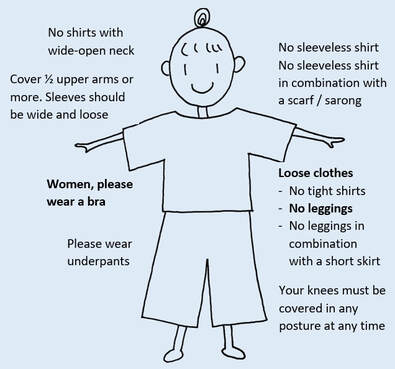 Click on the image to enlarge it
Click on the image to enlarge it
How to dress during the meditation retreat?
We ask you to cover your body from the upper arms to the knees. In Buddhist monasteries this means:
"Cover your body line", not only cover your skin!
For comfort and convenience in meditation, please wear loose fitting, lightweight clothing (but not see-through). We also ask that your clothes be neat, clean and sufficient to cover your body. No need to dress in white but decent colors would be appreciated. Pants must be long enough to cover the knees when sitting in meditation. Shirts must cover the upper arms and the midriff. Please no shorts, no leggings, or sleeveless shirts. Everyone, men and women, should wear undergarments (bras, underwear, shorts, etc.). It is unnecessary to wear jewelry or other forms of adornment during the retreat – keep it simple and comfortable.
We ask you to cover your body from the upper arms to the knees. In Buddhist monasteries this means:
"Cover your body line", not only cover your skin!
For comfort and convenience in meditation, please wear loose fitting, lightweight clothing (but not see-through). We also ask that your clothes be neat, clean and sufficient to cover your body. No need to dress in white but decent colors would be appreciated. Pants must be long enough to cover the knees when sitting in meditation. Shirts must cover the upper arms and the midriff. Please no shorts, no leggings, or sleeveless shirts. Everyone, men and women, should wear undergarments (bras, underwear, shorts, etc.). It is unnecessary to wear jewelry or other forms of adornment during the retreat – keep it simple and comfortable.
Miscellaneous
Health
Meditation is not physically demanding, but the mental requirements are hampered by poor health. If you are sick, you should wait for a later retreat. It takes some time for Western bodies, especially older ones, to adjust to the meditation posture and develop a stable one. If you have injured your back, neck, knees, or hips, these may give you some pain and difficulty. Please let us know so that we can help you deal with the situations that arise.
Language Problems
All the instruction is in English. Because we know many of our friends are not native speakers, we try to keep our speech simple, clear and straightforward. If you don't understand something, please do not get frustrated. Just try your best to follow along and get the main ideas.
Food
Two vegetarian meals, herbal tea and banana in the evening are provided every day. The food includes soybean products and coconut milk regularly, mush-rooms, eggs, other beans and peanuts occasionally, never meat and fish. No coffee is served during the retreat. The meals are taken together and in silence.
Health
Meditation is not physically demanding, but the mental requirements are hampered by poor health. If you are sick, you should wait for a later retreat. It takes some time for Western bodies, especially older ones, to adjust to the meditation posture and develop a stable one. If you have injured your back, neck, knees, or hips, these may give you some pain and difficulty. Please let us know so that we can help you deal with the situations that arise.
Language Problems
All the instruction is in English. Because we know many of our friends are not native speakers, we try to keep our speech simple, clear and straightforward. If you don't understand something, please do not get frustrated. Just try your best to follow along and get the main ideas.
Food
Two vegetarian meals, herbal tea and banana in the evening are provided every day. The food includes soybean products and coconut milk regularly, mush-rooms, eggs, other beans and peanuts occasionally, never meat and fish. No coffee is served during the retreat. The meals are taken together and in silence.
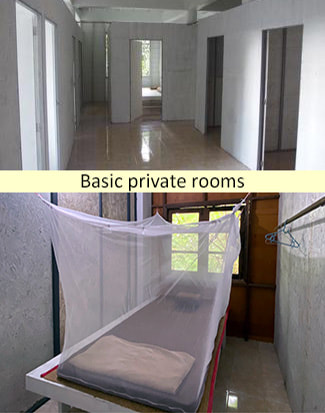
Accommodation
Since October 2020 small private non-aircon-rooms are provided in separate buildings for men and women respectively. The rooms contain a wooden bed with a soft mattress and soft pillow (since July 2023). There is no electricity socket in the room, toilets and showers are shared facilities. A blanket, mosquito net, bedsheet and pillowcase are supplied.
Valuables / distracting items
For the sake of safety and convenience, we ask that you deposit your valuables and distracting items in our safe. Then you won't have to worry about them and be distracted from your meditation. Deposit your valuables and distracting items including passport, money, credit cards, mobile phones, tablet, laptop, camera, radio, music player, watches, jewelry, books, cigarettes etc. You can collect them on the last day before you leave. Keep your day-to-day necessities with you in your room. Also keep a small amount of money in case you need to make small purchases during the retreat.
Emergency contact
In case you need to be contacted urgently, e.g., by your family, your relatives can use <[email protected]> as an emergency contact. Please inform your kin of this possibility before coming to Dipabhāvan since no wifi is available in the center.
Dipabhavan can be reached by the following phone number: (+66)096 - 993 6955
Accommodation
Since October 2020 small private non-aircon-rooms are provided in separate buildings for men and women respectively. The rooms contain a wooden bed with a soft mattress and soft pillow (since July 2023). There is no electricity socket in the room, toilets and showers are shared facilities. A blanket, mosquito net, bedsheet and pillowcase are supplied.
Valuables / distracting items
For the sake of safety and convenience, we ask that you deposit your valuables and distracting items in our safe. Then you won't have to worry about them and be distracted from your meditation. Deposit your valuables and distracting items including passport, money, credit cards, mobile phones, tablet, laptop, camera, radio, music player, watches, jewelry, books, cigarettes etc. You can collect them on the last day before you leave. Keep your day-to-day necessities with you in your room. Also keep a small amount of money in case you need to make small purchases during the retreat.
Emergency contact
In case you need to be contacted urgently, e.g., by your family, your relatives can use <[email protected]> as an emergency contact. Please inform your kin of this possibility before coming to Dipabhāvan since no wifi is available in the center.
Dipabhavan can be reached by the following phone number: (+66)096 - 993 6955